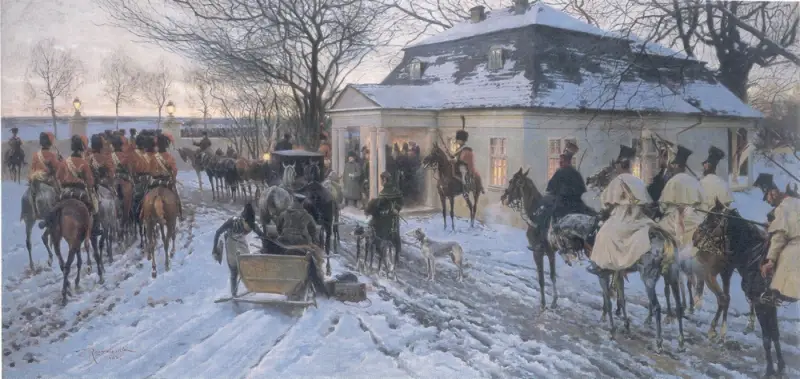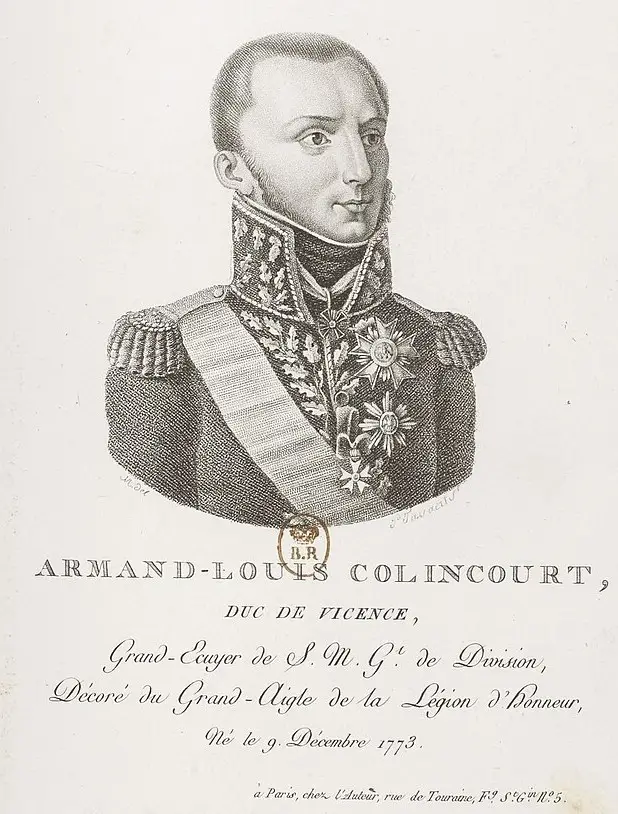About the circumstances of Napoleon's flight from Russia

Z. Rozvadovsky. Napoleon in Smorgon.
There is a common belief that on the Berezina, that is, at the end of November 1812, Napoleon abandoned the remnants of his “great army” and ran away from Russia.
In fact, Napoleon dictated his last order in Russia on December 5 in the town of Smorgon, located approximately halfway between Minsk and Vilna (currently Smorgon is a city in Belarus).
Note that this last order should not be confused with the last bulletin (No. 29) about Napoleon’s campaign in Russia, compiled by Napoleon in Molodechno on December 3.
We know the contents of the order of December 5 from the memoirs of the ex-ambassador to Russia and close associate of Napoleon Armand Augustin Louis de Caulaincourt (not to be confused with his brother Auguste Jean Gabriel de Caulaincourt, the general who died at Borodino). These memoirs were published and republished in Russian in the part relating to Napoleon's Russian campaign (Caulaincourt A. Napoleon's campaign in Russia. M., 1943; 2002; 2016; 2022 / Smolensk, 1991 / M. – Tallinn, 1994; 2002). It is noteworthy that Caulaincourt’s memoirs were first published in our country in 1943.

It is also noteworthy that none of the titles of all nine chapters of this publication contains the word “Berezina”, which for a well-known reason has become a meme in the French language (fortunately, the stress in the Russian name falls on the last syllable), and the word “Smorgon” is contained twice: "Chapter VI. Retreat. From Krasny to Smorgon" and "Chapter VII. In a sleigh with Emperor Napoleon. From Smorgon to Warsaw."
So, an excerpt from Chapter VI:
“Smorgon, noon on December 5th. The Emperor leaves at 10 pm. He is accompanied by 200 members of his guard. After the transfer point between Smorgon and Oshmyany, he is accompanied to Oshmyany by a marching regiment located four leagues from here; convey orders to this regiment through General van Hoogendorp.
150 selected guards cavalrymen will be sent to a distance of one league from Oshmyany. The headquarters of the marching regiment and the squadron of guards lancers will be located at the stages between Smorgon and Oshmyany. The Neapolitans, who spent the night tonight between Vilna and Oshmyany, will place 100 horsemen in Medniki and 100 in Rumzhishki.
General van Hoogendorp will stop where he meets him the marching regiment, which should arrive on the 6th at Vilna, and order him to station 100 horsemen halfway to Kovno. He will order that 60 escort men and post horses, necessary for the chief of horsemen from Smorgon to the area beyond Vilkovishki, be ready in Vilna.
General van Hoogendorp will immediately return to Vilna and tell the Duke of Bassano to immediately go to the emperor in Smorgon.
The Emperor will travel with the Duke of Vincenza in His Majesty's carriage; in front is Mr. Vonsovich, behind is the court footman; the chief master of ceremonies, Count Lobo, one court footman and one worker - in a carriage; Baron Feng, court footman Constant, the keeper of the briefcase and one clerical servant are in a carriage.
The Chief of the Horse will warn the King of Naples, the Viceroy and the marshals to report to headquarters at seven o'clock. He will receive from the Chief of Staff a warrant to travel to Paris with his secretary Reineval, his couriers and his servants.”
The Polish artist Zygmunt Rozwadowski dedicated his painting “Napoleon in Smorgon” (oil, canvas, 100x209), painted in 1930 (at that time Smorgon was part of Poland), to such a significant event as the departure of the French emperor from the army.
The painting is currently on display in the Lodz Museum. It depicts the departure scene: in addition to the assembled troops, an orderly preparing a sleigh for the emperor, and an escort ready for the trip, one can see a snow-covered plain and an illuminated very decent house, on the porch of which Napoleon stands.
The picture became prophetic: just as the French left Smorgon, the Poles would have to leave here nine years after the painting was painted.
In this regard, one cannot help but recall that the author of the picture was the younger brother of General Tadeusz Rozwadowski, who was subjected to repression by Józef Pilsudski in 1926.
It is noteworthy that this was the second time that the French emperor abandoned his army and went home.
This first happened during the campaign in Egypt: on August 22, 1799, having transferred command of the expeditionary force to General Kleber, Napoleon sailed from Alexandria to France. This plot is still awaiting the brush of its artist...
Information